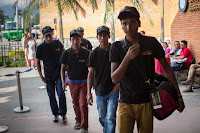Contractualization, while in most cases illegal, is a commonly used practice in Philippino companies to give workers temporary employment for just less than 6 months preventing them to be regularized. Short-term contract workers do not have the same benefits as regularized workers, such as social security, health insurance (Philhealth), unpaid leaves, a 13th month bonus. Moreover, contractual workers will be less eager to become a union member as they risk not having their contract renewed. While the Philippino president had vowed to phase out contractualization and has signed an executive order to that end, in reality the practices of labour-only contracting and job contracting are still omnipresent in Philippino companies.
KMU decided to focus their campaign against contractualization on mass filings for regularization, which appeared to be much more effective than individual legal aid to the workers. Contractual workers would file a document to the Department of Labour and Employment that they want their company to be investigated on compliance with the regulations on contractual work and security of tenure and that they want to be regularized as permanent workers. The lists that were filed contained some 2.900 to 3.000 companies with 300.000 workers which could be up for regularization. In some cases (Coca Cola, Magnolia), several hundreds of workers managed to become permanent workers, while others were not granted such status.






















